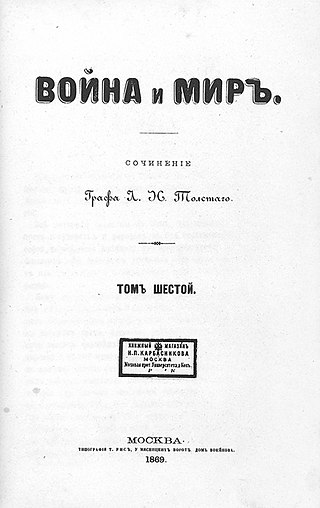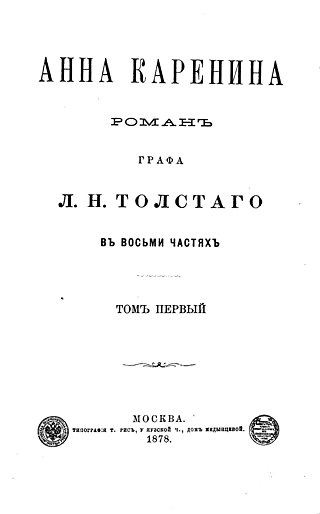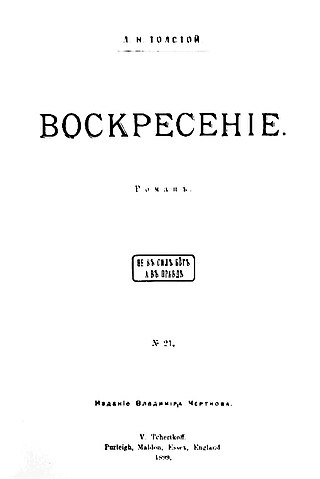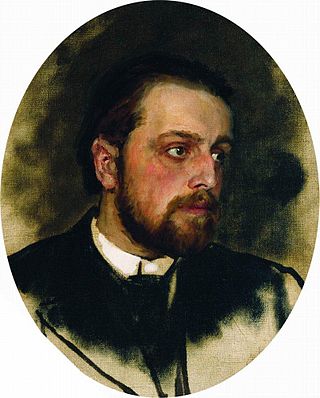"Wisdom of Children" (also translated as Little Girls Wiser than Men) is a short story by Russian author Leo Tolstoy first published in 1885. It takes the form of a parable about forgiveness.
"Wisdom of Children" (also translated as Little Girls Wiser than Men) is a short story by Russian author Leo Tolstoy first published in 1885. It takes the form of a parable about forgiveness.
The story opens at the beginning of Holy Week, when there is still melting snow on the ground. An older girl, Akulya, and a younger girl, Malasha, go outside to play. They both have just been given new frocks, but they insist on wading through one of the puddles from the melting snow. They both take off their shoes to keep them dry, and Akulya warns Malasha against splashing the water on her new frock. Malasha splashes Akulya despite her warning, and Akulya runs home in tears. Her mother is furious at the ruined frock, and she spanks Malasha in the middle of the street. Soon Malasha's mother emerges from her home, and the mothers begin arguing. The shouts brought the peasants into the street, who also began arguing with each other. The peasants start pushing each other, and Akulya's grandmother urges everyone to stop, but to no avail.
In the meantime, Akulya had washed off her frock, and she and Malasha returned to the pool. The two girls make a small boat out of bark, and they make a stream from the puddle. They go chasing after the boat together, as happy as ever. Akulya's grandmother urges everyone to follow the example of the children, and take their spirit of forgiveness into their own hearts.

War and Peace is a literary work by Russian author Leo Tolstoy. Set during the Napoleonic Wars, the work mixes fictional narrative with chapters discussing history and philosophy. First published serially beginning in 1865, the work was rewritten and published in its entirety in 1869. It is regarded as Tolstoy's finest literary achievement and remains an internationally praised classic of world literature.

Anna Karenina is a novel by the Russian author Leo Tolstoy, first published in book form in 1878. Considered to be one of the greatest works of literature ever written, Tolstoy himself called it his first true novel. It was initially released in serial installments from 1875 to 1877, all but the last part appearing in the periodical The Russian Messenger.

The Tolstoyan movement is a social movement based on the philosophical and religious views of Russian novelist Leo Tolstoy (1828–1910). Tolstoy's views were formed by rigorous study of the ministry of Jesus, particularly the Sermon on the Mount.

"Ivan the Fool" is an 1886 short story by Leo Tolstoy, published in 1886. The name "Ivan the Fool" alludes to a popular hero of Russian folklore.

Resurrection, first published in 1899, was the last novel written by Leo Tolstoy. The book is the last of his major long fiction works published in his lifetime. Tolstoy intended the novel as a panoramic view of Russia at the end of the 19th century from the highest to the lowest levels of society and an exposition of the injustice of man-made laws and the hypocrisy of the institutionalized church. The novel also explores the economic philosophy of Georgism, of which Tolstoy had become a very strong advocate towards the end of his life, and explains the theory in detail. The publication of Resurrection led to Tolstoy's excommunication by the Holy Synod from the Russian Orthodox Church in 1901.

Vladimir Grigoryevich Chertkov (Russian: Влади́мир Григо́рьевич Чертко́в; also transliterated as Chertkoff, Tchertkoff, or Tschertkow was the editor of the works of Leo Tolstoy, and one of the most prominent Tolstoyans. After the revolutions of 1917, Chertkov was instrumental in creating the United Council of Religious Communities and Groups, which eventually came to administer the Russian SFSR's conscientious objection program.

Aylmer Maude and Louise Maude (1855–1939) were English translators of Leo Tolstoy's works, and Aylmer Maude also wrote his friend Tolstoy's biography, The Life of Tolstoy. After living many years in Russia the Maudes spent the rest of their lives in England translating Tolstoy's writing and promoting public interest in his work. Aylmer Maude was also involved in a number of early 20th century progressive and idealistic causes.
"The Snowstorm" is a short story by the Russian author Leo Tolstoy. It was first published in 1856, in the literary and political magazine Sovremennik.

Old Bear and Friends is a popular series of children's books written by British author and illustrator Jane Hissey. The books became the basis for a BAFTA award-winning television series Old Bear Stories.
"What Men Live By" is a short story written by Russian author Leo Tolstoy in 1885. It is one of the short stories included in his collection What Men Live By, and Other Tales, published in 1885. The compilation also included the written pieces "The Three Questions", "The Coffee-House of Surat", and "How Much Land Does a Man Need?".

W"The Three Questions" is a 1903 short story by Russian author Leo Tolstoy as part of the collection What Men Live By, and Other Tales. The story takes the form of a parable, and it concerns a king who wants to find the answers to what he considers the three most important questions in life.
Promoting a Devil is a short story by Russian author Leo Tolstoy first published in 1886.. It is a cautionary tale story about a man who fell into a sinful life when he was given more than he needed.
"Quench the Spark" is a short story by Russian author Leo Tolstoy first published in 1885. The story takes the form of a parable concerning the virtues of reconciliation.
"The Grain" or "A Grain As Big As A Hen's Egg" is an 1886 short story by Leo Tolstoy about a king seeking to understand the properties of a grain he acquires.

Count Lev Nikolayevich Tolstoy, usually referred to in English as Leo Tolstoy, was a Russian writer regarded as one of the greatest authors of all time. He received nominations for the Nobel Prize in Literature every year from 1902 to 1906 and for the Nobel Peace Prize in 1901, 1902, and 1909.
"The Devil" is a novella by Leo Tolstoy. It was written in 1889, given an alternative ending in 1909, but published only posthumously in 1911. Like Tolstoy's The Kreutzer Sonata, written around the same time, "The Devil" deals with the consequences of sexual emotion.
"The Three Hermits" is a short story by Russian author Leo Tolstoy written in 1885 and first published in 1886 in the weekly periodical Niva (нива). It appeared in the short-story collection Twenty-Three Tales which was first translated into English for an edition released by Funk & Wagnalls in 1907. The title refers to its three central characters; unnamed simple monks living on a remote island in a life of prayer and contemplation "for the salvation of their souls."
"The Bear Hunt" is a short story by Leo Tolstoy written in 1872. It was translated as Desire Stronger than Necessity in 1888 by Nathan Haskell Dole.
"Three Days in the Village" is a short story by Leo Tolstoy written in 1909, one year before Tolstoy's death. Although classified as fiction, it is autobiographical in nature and details Tolstoy's life on his estate and his travels to nearby villages, and the contrasts between the two. It was translated by Louise Maude and Aylmer Maude.
Twenty-Three Tales is a popular compilation of short stories by Leo Tolstoy. According to its publisher, Oxford University Press, the collection is about contemporary classes in Russia during Tolstoy's time, written in a brief, morality-tale style. It was translated into English by Louise Maude and Aylmer Maude.